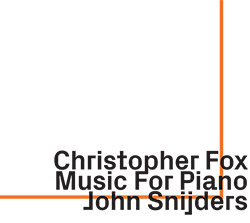
This collection brings together six compositions for solo piano, beautifully played by John Snijders, written by Fox over a period of some thirty years. Three pieces date from 1988-1992, one from 2004 and two from 2015-2018.
Of the three earlier works, two are quite short. "Worthless Leather" is very charming, apparently based on a Mendelssohn song, retaining a dreamy, dancelike quality, very simple and direct, similar in aspect, perhaps, to some of Howard Skempton's music. "You, Me, Us (Haba�era)", is somewhat more aggressive, with a high, steady rhythmic spine that tilts toward a Latin flavor (per Andy Hamilton's excellent notes, drawing from Bizet and Cole Porter). The 24-minute "More Light" is akin to the other, more recent compositions. That forward propulsion glimpsed in the prior piece is brought to the fore in a manner that recalls, to this listener, the motoric compositions of Louis Andriessen, certain traits of classic minimalism, as well as the kind of relentless drive heard in music like Fredric Rzewski's "Winnsboro Cotton Mill Blues". Fox (and Snijders) evince greater delicacy; as tumultuous and surging as the music becomes, the rhythms never outweigh the interest in complex overlays of melodic lines, consistently entwining themselves around one another. It shifts density throughout, always maintaining at least strands of melodic content and pausing for some rather dramatic low chords now and then. The whole thing has a kind of epic quality, very impressive.
The two newest pieces continue, to a degree, the explorations of "More Light". "The Red Studio" begins in a hesitant and questioning manner before resolutely entering a machine-like cadence. However, a lengthy, spacious section intervenes, quite lovely, small clusters allowed to hang, before, once again, the harsh, insistent rhythms reappear. The implacableness of this surging wall might be off-putting to some, but so much is going on within it, variations that are extremely rich and fascinating. It ends with a kind of additive/subtractive sequence that implies some sort of system, perhaps reminiscent of Tom Johnson, but less regular, more surprising. Belying its title a bit, "The Calm of Mountains" maintains a more or less steady pulse, never faltering but constantly in a state of tumbling apart and renewing itself. A mountain ridge? As prior, the chords allow no easy harmonies, no unearned solace but are replete with chewy nuggets of sound, always morphing in tonality and pace, always engrossing (and brilliantly played).
The disc concludes with "Boat Song" (2004), a dreamy song, almost a lullaby, like a late 19th century tune that somehow has seen a few decades into the future; a lovely, ghostly piece.
Excellent, imaginative music overall from a too-little known composer.
Comments and Feedback:



More Recent Reviews, Articles, and Interviews @ The Squid's Ear...


|

